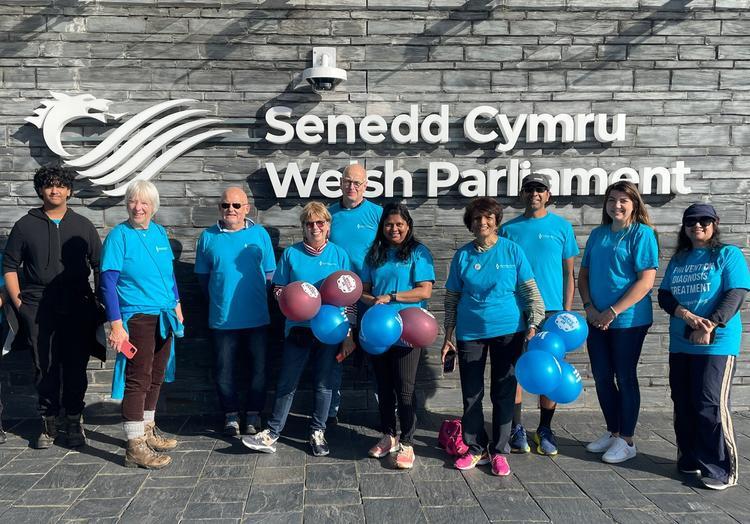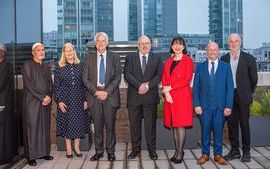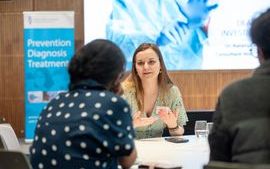- Published:
- 20 January 2025
- Author:
- Anu Gunavardhan
- Read time:
- 4 Mins
A recent pathology symposium was held in Cardiff to explore rare diseases, with presentations on digital pathology, prenatal pathology and haematology. College members also took to the Wales Coastal Path Walk with local politicians to raise awareness of rare diseases.
The Wales Pathology Symposium took place on 25 October 2024 at the Hilton Hotel in Cardiff, with the theme of ‘Rare diseases’. Alan Deacon, the National Pathology Lead for NHS Wales Executive, opened the event with an insightful overview of NHS Wales Executive’s structure. He emphasised its role as a mediator between the Welsh government and NHS Wales, contributing to strategic improvements and the implementation of innovative technologies in healthcare. Notably, he pointed out that 95% of all clinical pathways rely on pathology, which underscores its central role.
Deacon addressed key challenges in the field, including data gaps, limited decision-maker investment, unique geographic constraints and the ‘fragile’ status of some services. These challenges paved the way for the establishment of the National Pathology Programme in 2015, funded directly by the Welsh government, to support the development of high-quality, effective and sustainable pathology services in collaboration with health boards and trusts.
Key initiatives include advancing a national business case for digital cellular pathology (with procurement anticipated in 2025), securing funding for image storage solutions and expanding AI-driven reporting for breast, prostate, upper gastrointestinal and pan-cancer cases, as well as digital haematology and parasitology. Investments for automated microtomy are also on the horizon. In summary, Deacon noted that pathology would play a vital role in restoring and strengthening post-COVID-19 services, with the programme focused on establishing sustainable, efficient and timely pathology services for the future.

The second speaker, Dr Muhammad Aslam, National Lead for Digital Pathology and AI, began by describing the early telepathology efforts that enabled remote frozen section reporting and discussed a milestone in the 2000s with Aperio scanners.
Wales led the UK with its first all-Wales digital pathology validation, scanning and reporting 3,001 cases across 6 health boards by 22 pathologists. New scanners are now available in each health board, with 20% of Betsi Cadwaladr Health Board cases now digitally scanned. The Welsh Lymphoma and Soft Tissue Sarcoma Services have adopted digital reporting, resulting in faster turnaround times.
Dr Aslam highlighted the present use of AI to enhance cancer detection, improve reporting efficiency and empower pathologists as digital transformation leaders. He outlined upcoming AI applications, including automated mitosis counting, PD-L1 and MSI analysis, HER2 assessments, automatic hormone receptor testing in breast cancer and AI-based smart reporting.
Sophie Bannister, trainee clinical scientist, presented on the evaluation of the non-invasive prenatal testing (NIPT) service in Wales. Her study highlighted the service's focus on detecting fetal anomalies identified via ultrasound screening for conditions such as Down, Edwards, and Patau syndromes. She detailed how NIPT has provided a safer, non-invasive testing option for ongoing pregnancies with anomalies, with significant utility in high-risk pregnancies. Patient management outcomes and the broader benefits of this service were key points of discussion.
Next, Fiona Kerr, trainee clinical scientist, introduced the Pregnancy-Related Rapid Sequencing (PRRS) Service in NHS Wales, a new approach using whole exome sequencing to investigate major fetal structural abnormalities. Launched by the All Wales Medical Genomics Service in March 2023, the service focuses on non-viable pregnancies, aiding clinicians in managing cases and assessing recurrence risks. Early data shows a 50% diagnostic yield, underscoring the value of PRRS in guiding future pregnancy decisions.
Dr Bernie Croal, College President, followed with an update on the strategic outlook for the next 5 years. The College continues to position itself as a leader in pathology excellence, upholding high standards in education and training, fostering member pride and engagement, and advocating for pathology at governmental levels. He encouraged members to get involved and help drive the College's mission forward.
Dr Tariq El-Shanawany, consultant clinical immunologist, then discussed the diagnostic importance of calculated globulin levels. High levels may indicate haematological malignancies or the presence of paraproteins, while low levels could suggest other health issues. He highlighted the integration of globulin analysis with the All-Wales Laboratory Information Management System, which could streamline diagnostics and enhance service quality.
Dr Danja Schulenburg-Brand, a consultant in metabolic medicine, gave an overview of porphyria services in Wales, emphasising biochemistry's role in diagnosing symptomatic patients. She provided insights into the different types and phenotypes of porphyria, as well as diagnostic challenges, underscoring the importance of specialised services for affected individuals.
The symposium concluded with 3 award-winning poster presentations. The first-place award went to Dr Mark Ponsford and his team for their audit of referrals following perioperative anaphylaxis, stressing the need for a sustainable perioperative allergy network in Wales to address service gaps.
Ms Felicity May presented the second-place poster on introducing non-invasive prenatal testing for fetal RHD genotyping in Wales. This collaboration between the Welsh Blood Service and Antenatal Screening Wales allows for targeted antenatal prophylaxis, projected to benefit approximately 1,500 women annually by reducing the need for routine antenatal anti-D prophylaxis.
The third presentation was by Dr Heath, who discussed a thyroid cytology audit based on the North Wales experience. Cytology-to-histology correlation and College guideline compliance were audited and the North Wales 1-stop neck lump clinic was highlighted. This is a service that provides a streamlined pathway with same-day appointments, radiology imaging and fine needle aspiration with cytology reports, enhancing patient experience and reducing turnaround times.
Overall, the symposium was well received by attendees. The day provided valuable insights into the critical role of pathology in driving service improvement, running rare disease diagnostic services, spurring technological innovation and providing patient care in Wales.
The Wales Coastal Path Walk took place on 26 October to raise awareness about rare diseases. Organised in collaboration with groups such as Nerve Tumours UK, Ethnic Minority Women in Welsh Healthcare, Medics For Rare Diseases and SWAN Clinic UK, the event began on a beautiful, warm autumn morning at Penarth Pier Pavilion. Participants walked along the coastal path through Cardiff Harbour, ending at the Senedd. We were joined by Jenny Rathbone MS and Gwenda Roberts, the Mayor of Penarth.
Engaging with the public along the way, we shared pathology flyers and enjoyed in-depth conversations with both politicians and other walkers. The event concluded with an invitation to the Senedd for refreshments and further discussions – an inspiring and successful day overall.
Return to January 2025 Bulletin




